EC
-
 Green Technology for Data Centers: Ultra-low Power 100 Gbps Ethernet Integrated Circuit Developed
A new integrated circuit (IC), consuming only 0.75W of electricity, will reduce the power usage of data chips installed at data centers by one-third.
Each day, billions of people surf the Internet for information, entertainment, and educational content. The Internet contains an immeasurable amount of information and knowledge generated every minute all around the world that is readily available to everyone with a click of a computer mouse. The real magic of the Internet, however, lies in data centers, where hundreds of billions of data are stored and distributed to designated users around the clock.
Today, almost every business or organization either has its own data centers or outsources data center services to a third party. These centers house highly specialized equipment responsible for the support of computers, networks, data storage, and business security. Accordingly, the operational cost of data centers is tremendous because they consume a large amount of electricity.
Data centers can consume up to 100 times more energy than a standard office building. Data center energy consumption doubled from 2000 to 2006, reaching more than 60 billion kilowatt hours per year. If the current usage and technology trends continue, the energy consumption of data centers in the US will reach 8% of the country’s total electric power consumption by 2020.
A research team at the Korea Advanced Institute of Science and Technology (KAIST) and Terasquare, Inc. (
http://www.terasquare.co.kr
), a spin-off company of the university,
developed an extremely low-powered integrated circuit for Ethernet that consumes less than 0.75W of electricity but is able to send and receive data at the high speed of 100 gigabits per second (Gbps). The research team, headed by Hyeon-Min Bae, assistant professor of electrical engineering at KAIST, claims that the new microchip uses only one-third of the electricity consumed by the currently installed chips at data centers, thereby helping the centers to save energy.
Integrated circuits are embedded on communication modules that are inserted into a line card. Data centers have numerous line cards to build a network including routers and switches. Currently, 8W ICs are the most common in the market, and they consume a lot of energy and require the largest modules (112 cm
2
of CFP), decreasing the port density of line cards and, thus, limiting the amount of data transmission.
The ultra-low-power-circuit, 100-gigabit, full-transceiver CDR, is the world’s first solution that can be loaded to the smallest communication modules (20 cm
2
of CFP4 or 16 cm
2
of
QSFP28), the next-generation chips for data centers. Compared with other chip producers, the 100 Gbps CDR is a greener version of the technology that improves the energy efficiency of data centers while maintaining the high speed of data transmission.
Professor Hyeon-Min Bae said, “When we demonstrate our chip in September of this year at one of the leading companies that manufacture optical communication components and systems, they said that our product is two years ahead of those of our competitors. We plan to produce the chip from 2014 and expect that it will lead the 100 Gbps Ethernet IC market, which is expected to grow to USD 1 billion by 2017.”
The commercial model of the IC was first introduced at the 39
th
European Conference and Exhibition on Optical Communication (ECOC), the largest optical communication forum for new results and developments in Europe, held from September 22-26 at ExCeL London, an international exhibition and convention center.
Professor Bae added, “We received positive responses to our ultra-low-power 100-Gbps Ethernet IC at the ECOC. The chip will be used not only for a particular industry but also for many of next-generation, super-high-speed information communications technologies, such as high-speed USB, high-definition multimedia interface (HDMI), and TV interface.”
Before joining KAIST, Hyeon-Min Bae worked for many years at Finisar as a researcher who designed and developed the world’s first super-high-speed circuit, the 100 Gbps Ethernet IC.
2013.11.25 View 10338
Green Technology for Data Centers: Ultra-low Power 100 Gbps Ethernet Integrated Circuit Developed
A new integrated circuit (IC), consuming only 0.75W of electricity, will reduce the power usage of data chips installed at data centers by one-third.
Each day, billions of people surf the Internet for information, entertainment, and educational content. The Internet contains an immeasurable amount of information and knowledge generated every minute all around the world that is readily available to everyone with a click of a computer mouse. The real magic of the Internet, however, lies in data centers, where hundreds of billions of data are stored and distributed to designated users around the clock.
Today, almost every business or organization either has its own data centers or outsources data center services to a third party. These centers house highly specialized equipment responsible for the support of computers, networks, data storage, and business security. Accordingly, the operational cost of data centers is tremendous because they consume a large amount of electricity.
Data centers can consume up to 100 times more energy than a standard office building. Data center energy consumption doubled from 2000 to 2006, reaching more than 60 billion kilowatt hours per year. If the current usage and technology trends continue, the energy consumption of data centers in the US will reach 8% of the country’s total electric power consumption by 2020.
A research team at the Korea Advanced Institute of Science and Technology (KAIST) and Terasquare, Inc. (
http://www.terasquare.co.kr
), a spin-off company of the university,
developed an extremely low-powered integrated circuit for Ethernet that consumes less than 0.75W of electricity but is able to send and receive data at the high speed of 100 gigabits per second (Gbps). The research team, headed by Hyeon-Min Bae, assistant professor of electrical engineering at KAIST, claims that the new microchip uses only one-third of the electricity consumed by the currently installed chips at data centers, thereby helping the centers to save energy.
Integrated circuits are embedded on communication modules that are inserted into a line card. Data centers have numerous line cards to build a network including routers and switches. Currently, 8W ICs are the most common in the market, and they consume a lot of energy and require the largest modules (112 cm
2
of CFP), decreasing the port density of line cards and, thus, limiting the amount of data transmission.
The ultra-low-power-circuit, 100-gigabit, full-transceiver CDR, is the world’s first solution that can be loaded to the smallest communication modules (20 cm
2
of CFP4 or 16 cm
2
of
QSFP28), the next-generation chips for data centers. Compared with other chip producers, the 100 Gbps CDR is a greener version of the technology that improves the energy efficiency of data centers while maintaining the high speed of data transmission.
Professor Hyeon-Min Bae said, “When we demonstrate our chip in September of this year at one of the leading companies that manufacture optical communication components and systems, they said that our product is two years ahead of those of our competitors. We plan to produce the chip from 2014 and expect that it will lead the 100 Gbps Ethernet IC market, which is expected to grow to USD 1 billion by 2017.”
The commercial model of the IC was first introduced at the 39
th
European Conference and Exhibition on Optical Communication (ECOC), the largest optical communication forum for new results and developments in Europe, held from September 22-26 at ExCeL London, an international exhibition and convention center.
Professor Bae added, “We received positive responses to our ultra-low-power 100-Gbps Ethernet IC at the ECOC. The chip will be used not only for a particular industry but also for many of next-generation, super-high-speed information communications technologies, such as high-speed USB, high-definition multimedia interface (HDMI), and TV interface.”
Before joining KAIST, Hyeon-Min Bae worked for many years at Finisar as a researcher who designed and developed the world’s first super-high-speed circuit, the 100 Gbps Ethernet IC.
2013.11.25 View 10338 -
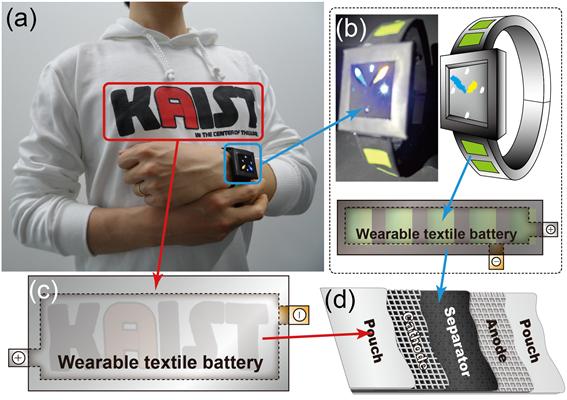 Technology Developed for Flexible, Foldable & Rechargeable Battery
Flexible, Foldable & Rechargeable Battery
The research group of professors Jang-Wook Choi & Jung-Yong Lee from the Graduate School of EEWS and Taek-Soo Kim from the Department of Mechanical Engineering at KAIST has developed technology for flexible and foldable batteries which are rechargeable using solar energy. The research result was published in the online issue of Nano Letters on November 5.
Trial versions of flexible and wearable electronics are being developed and introduced in the market such as Galaxy Gear, Apple’s i-Watch, and Google Glass. Research is being conducted to make the batteries softer and more wearable and to compete in the fast-growing market for flexible electronics.
This new technology is expected to be applied to the development of wearable computers as well as winter outdoor clothing since it is flexible and light. The research group expects that the new technology can be applied to current battery production lines without additional investment.
Professor Choi said, “It can be used as a core-source technology in the rechargeable battery industry in the future. Various wearable mobile electronic products can be developed through cooperation and collaboration within the industry.”
2013.11.21 View 12951
Technology Developed for Flexible, Foldable & Rechargeable Battery
Flexible, Foldable & Rechargeable Battery
The research group of professors Jang-Wook Choi & Jung-Yong Lee from the Graduate School of EEWS and Taek-Soo Kim from the Department of Mechanical Engineering at KAIST has developed technology for flexible and foldable batteries which are rechargeable using solar energy. The research result was published in the online issue of Nano Letters on November 5.
Trial versions of flexible and wearable electronics are being developed and introduced in the market such as Galaxy Gear, Apple’s i-Watch, and Google Glass. Research is being conducted to make the batteries softer and more wearable and to compete in the fast-growing market for flexible electronics.
This new technology is expected to be applied to the development of wearable computers as well as winter outdoor clothing since it is flexible and light. The research group expects that the new technology can be applied to current battery production lines without additional investment.
Professor Choi said, “It can be used as a core-source technology in the rechargeable battery industry in the future. Various wearable mobile electronic products can be developed through cooperation and collaboration within the industry.”
2013.11.21 View 12951 -
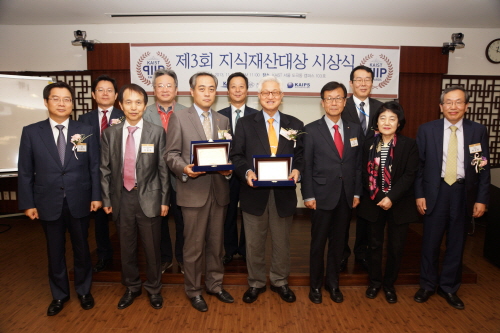 President of WIPA Sang-Hui Lee and SK Hynix Awarded the 2013 Intellectual Property Award
The ceremony for the 3rd Intellectual Property Award was held at the KAIST campus in Seoul on November 2nd. The award is given annually to Korean practitioners in intellectual property.
This year’s recipients were Sang-Hui Lee, the president of the World Intellectual Property Association of Korean Practitioners (WIPA) and the SK Hynix Patent Group which successfully defended a long-lasting claim against a patent specialist corporation.
The Intellectual Property Award (IP Award) is presented in recognition to Korean individuals or groups that contributed to national competitiveness through creation, application, or proceedings of intellectual property, as well as to building the foundation for the protection of patents, intellectual properties, and trademarks.
President Lee successfully hosted the Global Intellectual Property Summit in Seoul, which was held in October 2012. He was a crucial force behind the foundation of WIPA in May of this year and was also elected as the first president for the organization. Recently, President Lee has been at the forefront of job creation through the efficient use of intellectual property and the creative discovery of venture endeavors.
President Lee said, “The unique characteristic of a knowledge-based society lies in the collaboration network of people and knowledge property, startups based on intellectual property, and decentralized development.”
He added, “Just as Finland adopted a policy to build venture companies in utilization of intellectual properties and encouraged the decentralized growth throughout the nation after the collapse of Nokia, Korea must adapt to meet the changing requirements of the knowledge-intensive era.”
The SK Hynix Patent Group, another recipient for the Intellectual Property Award, won the lawsuit, dragged on for 13 years, against the Rambus, an American patent specialized corporation. The group initially lost the first trial in the federal court of California, but through relentless research and efforts, they won the case in the appeals court. The IP Award was co-hosted by the Korea Patent Attorney Association, the Korea Intellectual Property and Service Association, and KAIST.
2013.11.21 View 9905
President of WIPA Sang-Hui Lee and SK Hynix Awarded the 2013 Intellectual Property Award
The ceremony for the 3rd Intellectual Property Award was held at the KAIST campus in Seoul on November 2nd. The award is given annually to Korean practitioners in intellectual property.
This year’s recipients were Sang-Hui Lee, the president of the World Intellectual Property Association of Korean Practitioners (WIPA) and the SK Hynix Patent Group which successfully defended a long-lasting claim against a patent specialist corporation.
The Intellectual Property Award (IP Award) is presented in recognition to Korean individuals or groups that contributed to national competitiveness through creation, application, or proceedings of intellectual property, as well as to building the foundation for the protection of patents, intellectual properties, and trademarks.
President Lee successfully hosted the Global Intellectual Property Summit in Seoul, which was held in October 2012. He was a crucial force behind the foundation of WIPA in May of this year and was also elected as the first president for the organization. Recently, President Lee has been at the forefront of job creation through the efficient use of intellectual property and the creative discovery of venture endeavors.
President Lee said, “The unique characteristic of a knowledge-based society lies in the collaboration network of people and knowledge property, startups based on intellectual property, and decentralized development.”
He added, “Just as Finland adopted a policy to build venture companies in utilization of intellectual properties and encouraged the decentralized growth throughout the nation after the collapse of Nokia, Korea must adapt to meet the changing requirements of the knowledge-intensive era.”
The SK Hynix Patent Group, another recipient for the Intellectual Property Award, won the lawsuit, dragged on for 13 years, against the Rambus, an American patent specialized corporation. The group initially lost the first trial in the federal court of California, but through relentless research and efforts, they won the case in the appeals court. The IP Award was co-hosted by the Korea Patent Attorney Association, the Korea Intellectual Property and Service Association, and KAIST.
2013.11.21 View 9905 -
 Exhibition of High Technology Held by the Graduate School of Culture Technology at KAIST
Screen X technology, displaying objects simutaneously on three screens
The Graduate School of Culture Technology at KAIST hosted the “2013 Demo Day” on the 1st of November.
The purpose of the Demo Day was to introduce recent research accomplishments on culture technology (CT) to the public and discuss the direction of the future trend of CT.The technologies introduced at the exhibition were: Screen X which simultaneously uses three screens, MagGetz which uses magnets for smart phone applications, Space Touch which connects the virtual reality with the real world, and Avatar that recognizes augmented objects using augmented reality.
Research papers entitled “Digital Art and Entertainment” (Professor Sung-Hee Lee), “Social Network” (Professor Mi-Young Cha), and “Interactive Media and Space” (Professor Ji-Hyun Lee) were presented as well. The Graduate School of Culture Technology was founded in 2005 to combine digital media and culture. Research is conducted largely in the fields of digital art & entertainment, ambient communication, and interactive media & space.
2013.11.20 View 6827
Exhibition of High Technology Held by the Graduate School of Culture Technology at KAIST
Screen X technology, displaying objects simutaneously on three screens
The Graduate School of Culture Technology at KAIST hosted the “2013 Demo Day” on the 1st of November.
The purpose of the Demo Day was to introduce recent research accomplishments on culture technology (CT) to the public and discuss the direction of the future trend of CT.The technologies introduced at the exhibition were: Screen X which simultaneously uses three screens, MagGetz which uses magnets for smart phone applications, Space Touch which connects the virtual reality with the real world, and Avatar that recognizes augmented objects using augmented reality.
Research papers entitled “Digital Art and Entertainment” (Professor Sung-Hee Lee), “Social Network” (Professor Mi-Young Cha), and “Interactive Media and Space” (Professor Ji-Hyun Lee) were presented as well. The Graduate School of Culture Technology was founded in 2005 to combine digital media and culture. Research is conducted largely in the fields of digital art & entertainment, ambient communication, and interactive media & space.
2013.11.20 View 6827 -
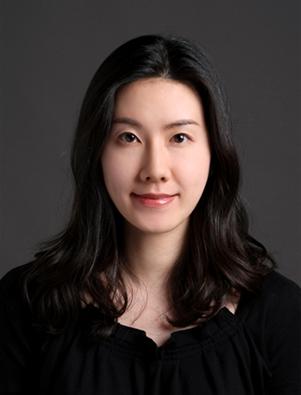 Professor Ji-Yun Lee, Received FAA Recognition Award
Professor Ji-Yun Lee, from the Department of Aerospace Engineering at KAIST, received the US Federal Aviation Administration (FAA) Recognition Award for her Ground-Based Augmentation System (GBAS) and her contribution to the development of satellite navigation technology.
GBAS contributes to the safety of aircraft navigation by providing flawless information with real-time location accuracy within one meter.
Professor Lee developed the monitoring software to improve the safety of GBAS users in her paper published in the International Journal of Radio Science in July of 2012.
The software will be distributed and used by many organizations including Eurocontrol following verification from the FAA technical center. It is expected to be standardized after discussions among international organizations.Professor Lee said, “As satellite navigation is applied to the infrastructure of air, marine, and ground transportation, as well as information & communications and finance, ensuring the performance and safety of the system is the most important factor. GBAS will be further developed and applied as a part of a global service system through international collaboration.”
2013.11.15 View 12385
Professor Ji-Yun Lee, Received FAA Recognition Award
Professor Ji-Yun Lee, from the Department of Aerospace Engineering at KAIST, received the US Federal Aviation Administration (FAA) Recognition Award for her Ground-Based Augmentation System (GBAS) and her contribution to the development of satellite navigation technology.
GBAS contributes to the safety of aircraft navigation by providing flawless information with real-time location accuracy within one meter.
Professor Lee developed the monitoring software to improve the safety of GBAS users in her paper published in the International Journal of Radio Science in July of 2012.
The software will be distributed and used by many organizations including Eurocontrol following verification from the FAA technical center. It is expected to be standardized after discussions among international organizations.Professor Lee said, “As satellite navigation is applied to the infrastructure of air, marine, and ground transportation, as well as information & communications and finance, ensuring the performance and safety of the system is the most important factor. GBAS will be further developed and applied as a part of a global service system through international collaboration.”
2013.11.15 View 12385 -
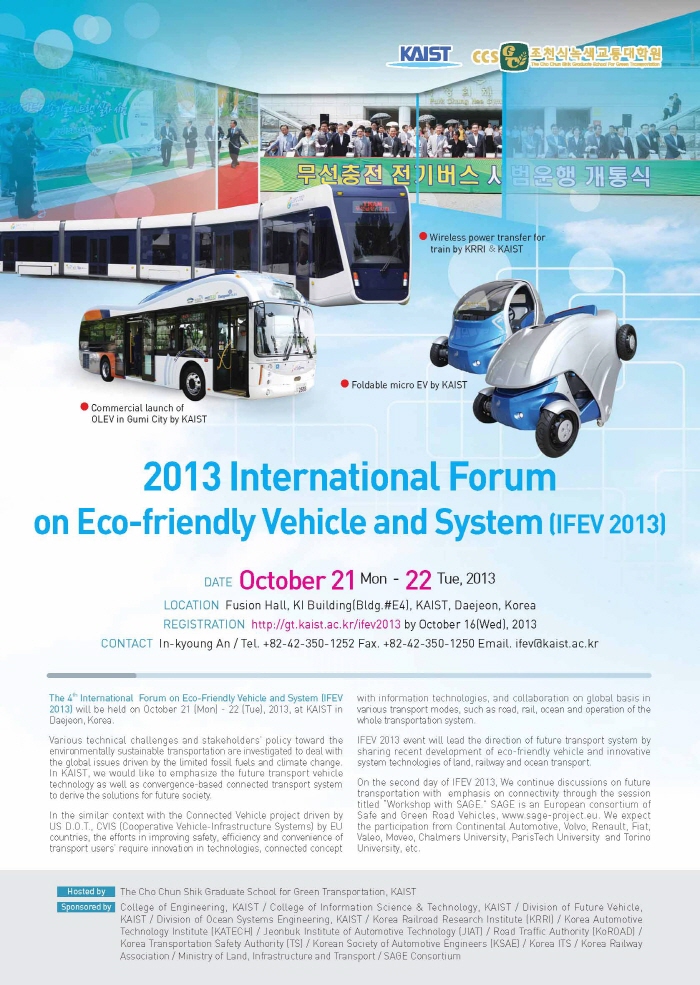 2013 International Forum on Eco-Friendly Vehicle and System
Leaders in transportation technology gathered at KAIST to discuss commercialization & standardization and to encourage the exchange of research progress, strategy, and future initiatives in transportation technology.
The Graduate School for Green Transportation at KAIST hosted the 2013 International Forum on Eco-friendly Vehicles and Systems (IFEV) in Fusion Hall of the KAIST Institute Building from October 21 to 22.
About 50 leaders in the field of future transportation from academic institutes and industries including Dr. Soon-Man Hong, President of Korea Railroad Research Institute (KRRI), Dr. Kwang-Hee Nam, Professor at Pohang University of Science and Technology (POSTECH), and Mr. Mike Schagrin, the Intelligent Transportation Systems Program Manager of the US Department of Transportation (retired) participated in the 4th annual IFEV.
The commercialization & standardization session and a technical session were followed by the plenary meeting of the forum.
Dr. Hong, the keynote speaker, introduced the High Capacity Double Deck High Speed Train, Near Surface Subway System, and Urban Railway System with Wireless Power Transfer Technology under the title “Korea’s Policy and Technology Initiative for Enhancing Green Transport Systems.”
Dr. Kwang-Hee Nam presented “Electric Vehicle Trends & the POSTECH E-Car Research Center Power Train Design,” followed by Mr. Mike Schagrin who spoke about “Going Green with Connected Automation.”
Dr. Omer C. Onar from the Oak Ridge National Laboratory (ORNL) shared recent research on “ORNL Development in Stationary and Dynamic Wireless Charging.”
In the commercialization session, Faical Turki of Vahle, Germany, presented “Wireless Inductive Battery Chargers,” and Professor Kazuyuki Ouchi from Tokyo University presented “Wind Challenger, the Next Generation Hybrid Vessels.”
In the technical session, presentations and discussions were performed on future ground vehicles and railroad technology, intelligent transportation systems and strategy, and policy on eco-friendly vehicle technology, including Professor In-Soo Suh of the Graduate School for Green Transportation at KAIST who presented on “Armadillo-T: 4WD Micro Electric EV with a Foldable Body Concept.”
On the second day of IFEV 2013, representatives of the European Union’s Safe and Green Road Vehicles (SAGE) consortium discussed connectivity in road transportation as a means of improving safety, efficiency and convenience in future safe and green vehicles with collaboration from Korean transportation organizations such as the Korea Transport Institute and Electronics and Telecommunications Research Institute.
Professor Suh, who organized the forum, said, “This forum will serve as an excellent opportunity to discuss and share R&BD progress in the green transportation field. “Details can be found at http://gt.kaist.ac.kr/ifev2013/.
2013.11.15 View 13749
2013 International Forum on Eco-Friendly Vehicle and System
Leaders in transportation technology gathered at KAIST to discuss commercialization & standardization and to encourage the exchange of research progress, strategy, and future initiatives in transportation technology.
The Graduate School for Green Transportation at KAIST hosted the 2013 International Forum on Eco-friendly Vehicles and Systems (IFEV) in Fusion Hall of the KAIST Institute Building from October 21 to 22.
About 50 leaders in the field of future transportation from academic institutes and industries including Dr. Soon-Man Hong, President of Korea Railroad Research Institute (KRRI), Dr. Kwang-Hee Nam, Professor at Pohang University of Science and Technology (POSTECH), and Mr. Mike Schagrin, the Intelligent Transportation Systems Program Manager of the US Department of Transportation (retired) participated in the 4th annual IFEV.
The commercialization & standardization session and a technical session were followed by the plenary meeting of the forum.
Dr. Hong, the keynote speaker, introduced the High Capacity Double Deck High Speed Train, Near Surface Subway System, and Urban Railway System with Wireless Power Transfer Technology under the title “Korea’s Policy and Technology Initiative for Enhancing Green Transport Systems.”
Dr. Kwang-Hee Nam presented “Electric Vehicle Trends & the POSTECH E-Car Research Center Power Train Design,” followed by Mr. Mike Schagrin who spoke about “Going Green with Connected Automation.”
Dr. Omer C. Onar from the Oak Ridge National Laboratory (ORNL) shared recent research on “ORNL Development in Stationary and Dynamic Wireless Charging.”
In the commercialization session, Faical Turki of Vahle, Germany, presented “Wireless Inductive Battery Chargers,” and Professor Kazuyuki Ouchi from Tokyo University presented “Wind Challenger, the Next Generation Hybrid Vessels.”
In the technical session, presentations and discussions were performed on future ground vehicles and railroad technology, intelligent transportation systems and strategy, and policy on eco-friendly vehicle technology, including Professor In-Soo Suh of the Graduate School for Green Transportation at KAIST who presented on “Armadillo-T: 4WD Micro Electric EV with a Foldable Body Concept.”
On the second day of IFEV 2013, representatives of the European Union’s Safe and Green Road Vehicles (SAGE) consortium discussed connectivity in road transportation as a means of improving safety, efficiency and convenience in future safe and green vehicles with collaboration from Korean transportation organizations such as the Korea Transport Institute and Electronics and Telecommunications Research Institute.
Professor Suh, who organized the forum, said, “This forum will serve as an excellent opportunity to discuss and share R&BD progress in the green transportation field. “Details can be found at http://gt.kaist.ac.kr/ifev2013/.
2013.11.15 View 13749 -
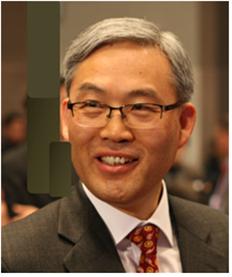 Professor Chun-Taek Rim Appointed as Associate Editor for IEEE TPEL
Professor Chun-Taek Rim of the nuclear and quantum engineering at KAIST was appointed as an associate editor of the Institute of Electrical and Electronics Engineers (IEEE) Transactions on Power Electronics (TPEL), an eminent academic journal bio-monthly published in the field of power electronics.The journal has a high impact factor (4.08), a measure reflecting the average number of citations to recent articles published in an academic journal, which ranks as the 6th the most influential journal among the 100 journals published by IEEE.Professor Rim was also appointed to an associate editor for IEEE Journal of Emerging and Selected Topics in Power Electronics in September in recognition of his expertise in wireless power and electric vehicles.
2013.11.15 View 11845
Professor Chun-Taek Rim Appointed as Associate Editor for IEEE TPEL
Professor Chun-Taek Rim of the nuclear and quantum engineering at KAIST was appointed as an associate editor of the Institute of Electrical and Electronics Engineers (IEEE) Transactions on Power Electronics (TPEL), an eminent academic journal bio-monthly published in the field of power electronics.The journal has a high impact factor (4.08), a measure reflecting the average number of citations to recent articles published in an academic journal, which ranks as the 6th the most influential journal among the 100 journals published by IEEE.Professor Rim was also appointed to an associate editor for IEEE Journal of Emerging and Selected Topics in Power Electronics in September in recognition of his expertise in wireless power and electric vehicles.
2013.11.15 View 11845 -
 KAIST's Partnership Agreement with the Imperial College of Science, Technology and Medicine, UK
KAIST signed an agreement on academic and research cooperation with the Imperial College of Science, Technology (Imperial College London) and Medicine in the United Kingdom (UK) on November 6th, 2013 in London.
The two universities have been implementing collaboration programs at the department level in the areas of plastic electronics since September 2012 and systems engineering and molecular simulation since February 2013, but have never had a formal partnership agreement.
President Steve Kang from KAIST and Provost James Stirling from Imperial College London signed the comprehensive cooperation agreement which will not only strengthen the existing collaborations between the two institutions but also explore areas of mutual interest in the interdisciplinary study of big data, as well as in the fields of mechanical engineering, synthetic biology, and quantum physics.
Workshops, seminars, lectures, and conferences will be jointly organized and held to facilitate the exchange of research staff and faculty and to promote collaborations in research assignments. The universities will also look into the possibility of exchange programs for undergraduate and graduate students.
The partnership agreement will be effective for five years.
Minister Moon-Gi Choi from the Republic of Korea’s Ministry of Science, Information and Communications Technology (ICT) & Future Planning attended the signing ceremony as well and congratulated the establishment of the partnership, saying:
“We are living in the age of highly advanced science and technology that requires us to have a new economic development paradigm for sustainable growth. Through convergence research based on the application of ICT and technology innovation, we will have new opportunities for development. I hope KAIST and the Imperial College London will be at the forefront of such endeavors in coming years.”With its history spanning over 100 years, the Imperial College London is a public research university located in London, UK, specializing in science, engineering, medicine, and business. The university is regarded as being one of the most prestigious universities in the world, having eminent alumni such as Thomas Henry Huxley (biologist), H.G. Wells (author), and Sir Alexander Fleming (pharmacologist).
From left to right: Provost James Stirling, Minister Moon-Gi Choi, and President Steve Kang
2013.11.12 View 10126
KAIST's Partnership Agreement with the Imperial College of Science, Technology and Medicine, UK
KAIST signed an agreement on academic and research cooperation with the Imperial College of Science, Technology (Imperial College London) and Medicine in the United Kingdom (UK) on November 6th, 2013 in London.
The two universities have been implementing collaboration programs at the department level in the areas of plastic electronics since September 2012 and systems engineering and molecular simulation since February 2013, but have never had a formal partnership agreement.
President Steve Kang from KAIST and Provost James Stirling from Imperial College London signed the comprehensive cooperation agreement which will not only strengthen the existing collaborations between the two institutions but also explore areas of mutual interest in the interdisciplinary study of big data, as well as in the fields of mechanical engineering, synthetic biology, and quantum physics.
Workshops, seminars, lectures, and conferences will be jointly organized and held to facilitate the exchange of research staff and faculty and to promote collaborations in research assignments. The universities will also look into the possibility of exchange programs for undergraduate and graduate students.
The partnership agreement will be effective for five years.
Minister Moon-Gi Choi from the Republic of Korea’s Ministry of Science, Information and Communications Technology (ICT) & Future Planning attended the signing ceremony as well and congratulated the establishment of the partnership, saying:
“We are living in the age of highly advanced science and technology that requires us to have a new economic development paradigm for sustainable growth. Through convergence research based on the application of ICT and technology innovation, we will have new opportunities for development. I hope KAIST and the Imperial College London will be at the forefront of such endeavors in coming years.”With its history spanning over 100 years, the Imperial College London is a public research university located in London, UK, specializing in science, engineering, medicine, and business. The university is regarded as being one of the most prestigious universities in the world, having eminent alumni such as Thomas Henry Huxley (biologist), H.G. Wells (author), and Sir Alexander Fleming (pharmacologist).
From left to right: Provost James Stirling, Minister Moon-Gi Choi, and President Steve Kang
2013.11.12 View 10126 -
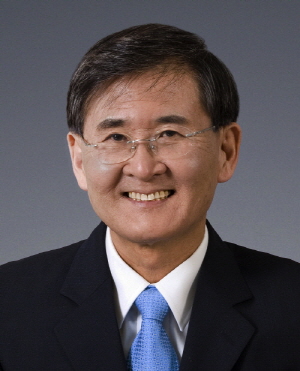 The World Economic Forum Invites KAIST to 2014 Davos Forum
President Steve Kang and Distinguished Professor Sang Yup Lee have been invited by the World Economic Forum (WEF) to attend its annual meeting slated for January 22-25, 2014 in Davos-Klosters, Switzerland.
The president will also join the Global University Leaders Forum (GULF) to be held during the annual meeting. The GULF consists of leading research universities throughout the world, at which President Kang will address agenda related to higher education and research.
From September 11th to 13th, KAIST was invited to the WEF’s 2013 Summer Davos Forum held in Dalian, China. The Summer Davos Forum is recognized as a barometer of the world economy, and KAIST hosted three sessions there.
In a session titled “Smart Regulations,” Professor Sang Yup Lee hosted presentations and discussions under the topic of “How regulation models can strengthen technical innovation and expansion.” President Steve Kang, Peter Sands, CEO of Standard Chartered Bank Group, Mark Weinberger, CEO of Ernest & Young, and Peter Terium, CEO of RWE, participated in the discussions.
The KAIST delegates also presented and participated in a session titled “From Trade Center to Innovative Hub” to discuss how to lead innovations in Asia, as well as “Marine Resources: Finding New Frontier” to address issues of how to develop and manage oceanic resources for potential growth.
President Kang said, “The World Economic Forum allows us to introduce the results of our innovative and creative research to global leaders and to demonstrate that our global position continues to grow.”
The WEF has been hosting Summer Davos Forum in China since 2007. About 1,500 participants from over 90 countries joined in this year’s summer forum under the theme of “Innovation: Inevitable Mainstream.” New strategies for innovations and solutions for global threats were suggested through presentations and discussions in 125 sessions.
The World Economic Forum (WEF) is an independent, international, and non-profit organization based in Geneva, Switzerland. It is committed to improving the state of the world by engaging business, political, academic, and government leaders to shape global, regional and industry agenda.
Among the meetings and forums organized by the WEF, its annual meeting held each January in Davos, a.k.a. the Davos Forum, has been the best known gathering. The Davos Forum brings together some 2,500 top business leaders, international political leaders, selected intellectuals and journalists to discuss the most pressing issues facing the world including health and environment.
2013.11.07 View 12200
The World Economic Forum Invites KAIST to 2014 Davos Forum
President Steve Kang and Distinguished Professor Sang Yup Lee have been invited by the World Economic Forum (WEF) to attend its annual meeting slated for January 22-25, 2014 in Davos-Klosters, Switzerland.
The president will also join the Global University Leaders Forum (GULF) to be held during the annual meeting. The GULF consists of leading research universities throughout the world, at which President Kang will address agenda related to higher education and research.
From September 11th to 13th, KAIST was invited to the WEF’s 2013 Summer Davos Forum held in Dalian, China. The Summer Davos Forum is recognized as a barometer of the world economy, and KAIST hosted three sessions there.
In a session titled “Smart Regulations,” Professor Sang Yup Lee hosted presentations and discussions under the topic of “How regulation models can strengthen technical innovation and expansion.” President Steve Kang, Peter Sands, CEO of Standard Chartered Bank Group, Mark Weinberger, CEO of Ernest & Young, and Peter Terium, CEO of RWE, participated in the discussions.
The KAIST delegates also presented and participated in a session titled “From Trade Center to Innovative Hub” to discuss how to lead innovations in Asia, as well as “Marine Resources: Finding New Frontier” to address issues of how to develop and manage oceanic resources for potential growth.
President Kang said, “The World Economic Forum allows us to introduce the results of our innovative and creative research to global leaders and to demonstrate that our global position continues to grow.”
The WEF has been hosting Summer Davos Forum in China since 2007. About 1,500 participants from over 90 countries joined in this year’s summer forum under the theme of “Innovation: Inevitable Mainstream.” New strategies for innovations and solutions for global threats were suggested through presentations and discussions in 125 sessions.
The World Economic Forum (WEF) is an independent, international, and non-profit organization based in Geneva, Switzerland. It is committed to improving the state of the world by engaging business, political, academic, and government leaders to shape global, regional and industry agenda.
Among the meetings and forums organized by the WEF, its annual meeting held each January in Davos, a.k.a. the Davos Forum, has been the best known gathering. The Davos Forum brings together some 2,500 top business leaders, international political leaders, selected intellectuals and journalists to discuss the most pressing issues facing the world including health and environment.
2013.11.07 View 12200 -
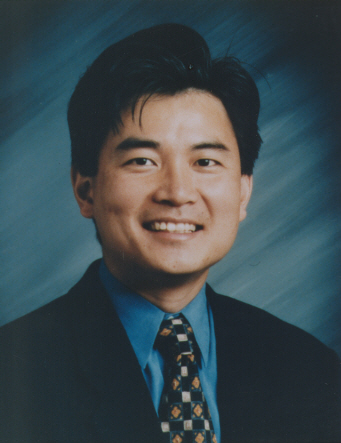 Professor Jae-Hyung Lee appointed as AIChE fellow
Professor Jae-Hyung Lee from the Department of Chemical and Bimolecular Engineering at KAIST was appointed as a fellow in the American Institute of Chemical Engineers (AIChE).
Established in 1908, AIChE is the largest association of chemical engineers worldwide, which now boasts more than 40,000 members from 90 countries.
Following Distinguished Professor Sang Yup Lee from the same department at KAIST, Professor Jae-Hyung Lee is the second Korean appointed as a fellow by the organization.
He has been acknowledged for his innovative research on the improvement of model predictive control of industrial processes.
Professor Lee is the director of the Saudi Armaco-KAIST CO2 Management Center at KAIST, a fellow of the Institute of Electrical and Electronics Engineers (IEEE) and the International Federation of Automatic Control (IFAC), and a member of the Korean Academy of Science and Technology.
He received the Young Investigator Award from the National Science Foundation (NSF) in 1994 and the Computing in Chemical Engineering Award from AIChE in 2013.
2013.11.05 View 10659
Professor Jae-Hyung Lee appointed as AIChE fellow
Professor Jae-Hyung Lee from the Department of Chemical and Bimolecular Engineering at KAIST was appointed as a fellow in the American Institute of Chemical Engineers (AIChE).
Established in 1908, AIChE is the largest association of chemical engineers worldwide, which now boasts more than 40,000 members from 90 countries.
Following Distinguished Professor Sang Yup Lee from the same department at KAIST, Professor Jae-Hyung Lee is the second Korean appointed as a fellow by the organization.
He has been acknowledged for his innovative research on the improvement of model predictive control of industrial processes.
Professor Lee is the director of the Saudi Armaco-KAIST CO2 Management Center at KAIST, a fellow of the Institute of Electrical and Electronics Engineers (IEEE) and the International Federation of Automatic Control (IFAC), and a member of the Korean Academy of Science and Technology.
He received the Young Investigator Award from the National Science Foundation (NSF) in 1994 and the Computing in Chemical Engineering Award from AIChE in 2013.
2013.11.05 View 10659 -
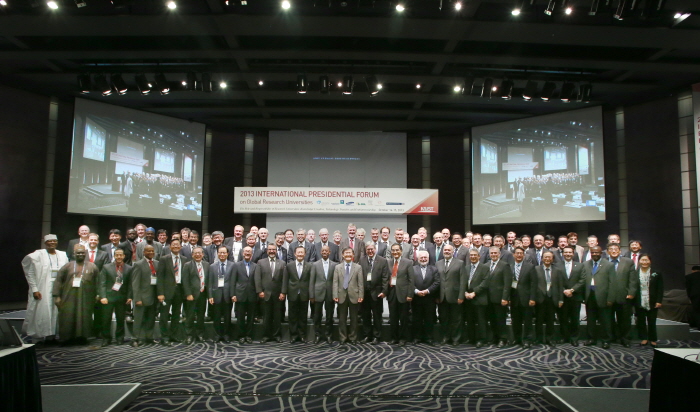 KAIST Hosted the 6th International Presidential Forum on Global Research Universities
More than 120 global leaders from higher education, private and public sectors, to discuss the promotion of economic growth through knowledge creation and entrepreneurship
The Korea Advanced Institute of Science and Technology (KAIST) held the 6th International Presidential Forum on Global Research Universities (IPFGRU) on October 15th at the Westin Chosun Hotel in Seoul, Republic of Korea.
About 64 presidents and vice presidents from 57 research universities in 28 nations attended for a presentation and panel discussion on the topic of “The Role and Responsibility of Research Universities: Knowledge Creation, Technology Transfer, and Entrepreneurship.”Annually held, the forum is organized to promote excellence and innovation in higher education and provide a place for discussion among prominent research university leaders and key policy-makers in the private and public sectors from across the world.Among the notable universities attending the 2013 forum were the University of California, Irvine, the École Polytechnique Fédérale de Lausanne, Technische Universität Berlin, Technion-Israel Institute of Technology, Tokyo Institute of Technology, Rice University, the University of Waterloo, and Massachusetts Institute of Technology (MIT). Government officials as well as representatives from business and industry such as Samsung Electronics, Korea Telecom, and Elsevier also joined the event.
The forum was proceeded with three separate sessions: Enabling Knowledge Creation, Entrepreneurship & University-Based Technology Transfer, and Higher Education & Strategic Knowledge Creation: Specialization & Performance, through which speakers and panelists examined how universities have played a role in knowledge creation and technology transfer, and ultimately how they have contributed to the development of national economies.
Keynote speakers were Michael Drake, chancellor of UC Irvine, and Jörg Steinbach, president of Technische Universität Berlin. Forum participants shared their experiences and insights in starting up knowledge- and technolgy-based new businesses.
Steve Kang, president of KAIST, talked about the purpose of the 2013 IPFGRU:
“In the face of an ever-changing economic climate driven by shifts in technological advancement, demographic trends, and global integration, the role of research universities is becoming ever more significant in achieving sustainable economic growth. This forum will help participants from around the world to define the choices ahead as universities seek the most productive and beneficial models for cooperation with industry, venture startups, and government.”For the 2013 IPFGRU, Ministry of Science, ICT, and Future Planning, ROK, Saudi Aramco, Samsung Heavy Industries, S-Oil, Elsevier, Thomson Reuters, and the Korea Economic Daily were forum sponsors.
2013.11.04 View 11708
KAIST Hosted the 6th International Presidential Forum on Global Research Universities
More than 120 global leaders from higher education, private and public sectors, to discuss the promotion of economic growth through knowledge creation and entrepreneurship
The Korea Advanced Institute of Science and Technology (KAIST) held the 6th International Presidential Forum on Global Research Universities (IPFGRU) on October 15th at the Westin Chosun Hotel in Seoul, Republic of Korea.
About 64 presidents and vice presidents from 57 research universities in 28 nations attended for a presentation and panel discussion on the topic of “The Role and Responsibility of Research Universities: Knowledge Creation, Technology Transfer, and Entrepreneurship.”Annually held, the forum is organized to promote excellence and innovation in higher education and provide a place for discussion among prominent research university leaders and key policy-makers in the private and public sectors from across the world.Among the notable universities attending the 2013 forum were the University of California, Irvine, the École Polytechnique Fédérale de Lausanne, Technische Universität Berlin, Technion-Israel Institute of Technology, Tokyo Institute of Technology, Rice University, the University of Waterloo, and Massachusetts Institute of Technology (MIT). Government officials as well as representatives from business and industry such as Samsung Electronics, Korea Telecom, and Elsevier also joined the event.
The forum was proceeded with three separate sessions: Enabling Knowledge Creation, Entrepreneurship & University-Based Technology Transfer, and Higher Education & Strategic Knowledge Creation: Specialization & Performance, through which speakers and panelists examined how universities have played a role in knowledge creation and technology transfer, and ultimately how they have contributed to the development of national economies.
Keynote speakers were Michael Drake, chancellor of UC Irvine, and Jörg Steinbach, president of Technische Universität Berlin. Forum participants shared their experiences and insights in starting up knowledge- and technolgy-based new businesses.
Steve Kang, president of KAIST, talked about the purpose of the 2013 IPFGRU:
“In the face of an ever-changing economic climate driven by shifts in technological advancement, demographic trends, and global integration, the role of research universities is becoming ever more significant in achieving sustainable economic growth. This forum will help participants from around the world to define the choices ahead as universities seek the most productive and beneficial models for cooperation with industry, venture startups, and government.”For the 2013 IPFGRU, Ministry of Science, ICT, and Future Planning, ROK, Saudi Aramco, Samsung Heavy Industries, S-Oil, Elsevier, Thomson Reuters, and the Korea Economic Daily were forum sponsors.
2013.11.04 View 11708 -
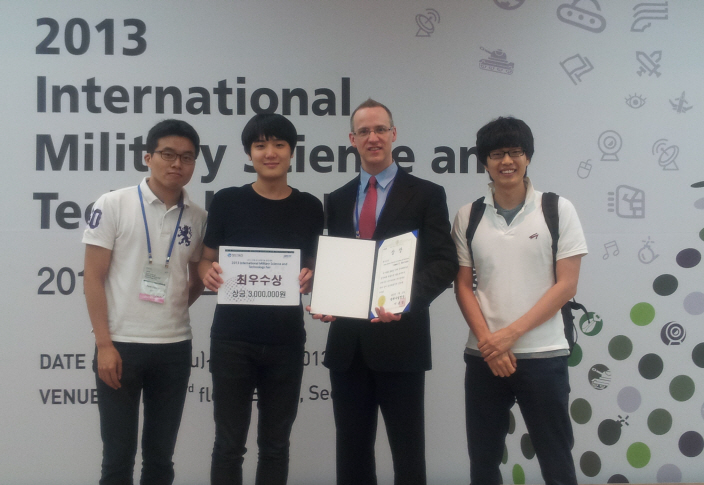 First Prize in the 2013 International Military Science and Technology Contest
Professor James R. Morrison and his students of the Industrial and Systems Engineering Department at KAIST were awarded the first prize in the 2013 International Military Science and Technology Contest organized by the Defense Acquisition Program Administration held in COEX from July 11 to 14.
The research group, Byungduk Song (Ph.D candidate), Jonghoe Kim (Ph.D candidate), Hyolin Park (MS candidate) and Professor James R. Morrison, received the first prize with their paper entitled “Automated and persistent UAV system for a complementary method for border patrol and target tracking.”
The Defense Acquisition Program Administration is the host of the annual contest which aims to contribute to the future of the defense industry and to expand technology exchange between private institutes and the military through the coordination of defense technology and advanced technology from industrial and educational cooperation.Professor Morrison’s team received the honor of the first-place prize out of 56 competitors from within Korea and 7 from overseas in the field of Synthetic New Technology/Academic Thesis.
2013.10.31 View 10163
First Prize in the 2013 International Military Science and Technology Contest
Professor James R. Morrison and his students of the Industrial and Systems Engineering Department at KAIST were awarded the first prize in the 2013 International Military Science and Technology Contest organized by the Defense Acquisition Program Administration held in COEX from July 11 to 14.
The research group, Byungduk Song (Ph.D candidate), Jonghoe Kim (Ph.D candidate), Hyolin Park (MS candidate) and Professor James R. Morrison, received the first prize with their paper entitled “Automated and persistent UAV system for a complementary method for border patrol and target tracking.”
The Defense Acquisition Program Administration is the host of the annual contest which aims to contribute to the future of the defense industry and to expand technology exchange between private institutes and the military through the coordination of defense technology and advanced technology from industrial and educational cooperation.Professor Morrison’s team received the honor of the first-place prize out of 56 competitors from within Korea and 7 from overseas in the field of Synthetic New Technology/Academic Thesis.
2013.10.31 View 10163